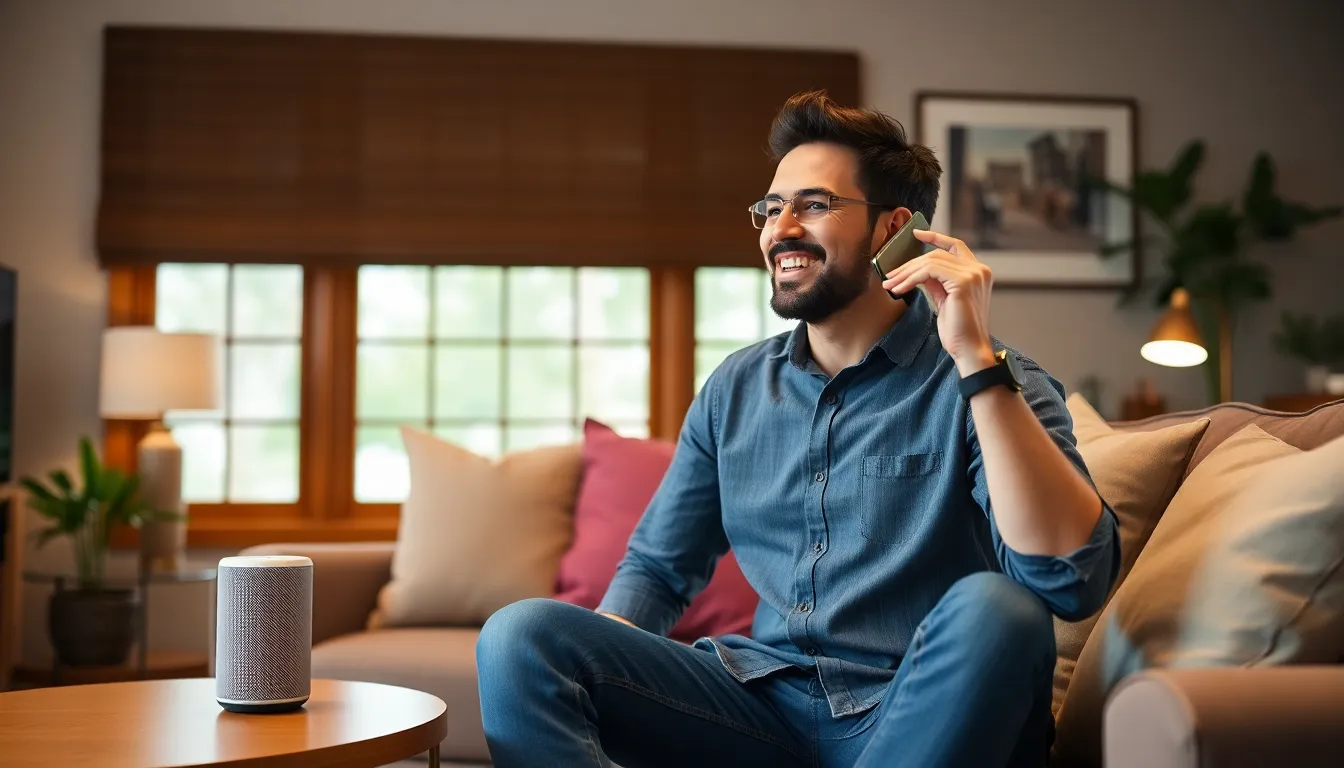Imagine lounging on your couch, popcorn in hand, when suddenly your smart speaker springs to life, ready to make a phone call. It’s like having a personal assistant who doesn’t judge your Netflix binge-watching habits. Smart speakers are revolutionizing the way people connect, turning mundane phone calls into hands-free conversations that feel almost futuristic.
Gone are the days of awkwardly fumbling with your phone while trying to multitask. With just a voice command, you can dial up friends, family, or even that one person who always calls during dinner. It’s convenience wrapped in a tech-savvy bow. As smart speakers continue to evolve, they’re not just here to play your favorite tunes; they’re transforming the way we communicate. So, let’s dive into the world of smart speaker phone calls and discover why they’re the next big thing in effortless chatting.
Table of Contents
ToggleOverview of Smart Speaker Phone Calls
Smart speakers play a vital role in modern communication by facilitating hands-free phone calls. Users can initiate calls easily by giving voice commands, which simplifies connecting with friends, family, or colleagues. Effortlessness defines the experience; individuals can multitask while conversing without needing a mobile device.
Communication capabilities are not limited to simple voice interactions. Many smart speakers integrate with contact lists and utilize advanced voice recognition technology for a seamless experience. Call quality has improved significantly, providing clarity that rivals traditional phone calls.
Familiarity with smart assistants streamlines the process. Commands such as “call [contact name]” or “dial [phone number]” trigger immediate results, making phone calls intuitive. Users enjoy the convenience of making calls from different rooms in their homes.
Privacy considerations remain crucial. Most smart speakers offer features to mute microphones or manage call logs securely, alleviating concerns about data privacy. Flexibility is another advantage; smart speakers cater to various devices, including smartphones and tablets, enhancing their utility in a connected home environment.
The integration of smart speakers extends beyond voice calls. Features like calendar reminders, message reading, and even video calls through compatible applications add depth to their functionality. As technology advances, the landscape of communication continues to evolve, positioning smart speakers as key players in the everyday lives of users.
Features of Smart Speakers
Smart speakers come equipped with numerous features that enhance the calling experience, making communication seamless and efficient.
Voice Control Capabilities
Voice control capabilities stand out as a primary feature of smart speakers. Users can initiate and manage phone calls through simple voice commands, enabling a hands-free experience. These devices utilize advanced voice recognition that understands natural language. Customizing commands provides flexibility, allowing users to address contacts by name or relation. Multitasking during calls becomes possible, as users can perform other tasks without disruption. Enhanced recognition technology ensures high accuracy in capturing instructions. As a result, making calls feels effortless and intuitive for users, regardless of their location in the home.
Integration with Communication Apps
Integration with communication apps extends smart speakers’ functionality beyond phone calls. Users can connect with popular applications like WhatsApp, Zoom, and Skype directly through their smart speakers. This connectivity allows for video calls, messaging, and sharing information, enriching the user experience. Notifications from these apps can also be read aloud, keeping users informed without needing a screen. Compatibility with various devices enhances this experience, as users can seamlessly bridge calls across different platforms. Overall, the integration of communication apps into smart speakers cultivates a holistic approach to modern communication, contributing to its growing importance in daily life.
Benefits of Using Smart Speaker Phone Calls
Smart speaker phone calls offer numerous advantages that enhance communication significantly. Users experience a new level of convenience and efficiency through this technology.
Hands-Free Convenience
Hands-free phone calls allow users to engage in conversations without holding a device. Voice commands make initiating calls seamless, enabling multitasking during daily activities. While preparing meals, individuals can place calls easily while their hands remain free. This capability enables contactless communication, making everyday tasks more manageable. Users can also connect with contacts across various rooms, enhancing accessibility throughout the home.
Enhanced Communication Experience
Smart speakers elevate the communication experience through superior voice recognition technology. Clarity during calls rivals traditional systems, ensuring participants connect effortlessly. Users find it intuitive to navigate contacts and initiate calls with simple phrases. Integration with popular communication platforms like WhatsApp and Zoom enhances functionality, allowing for messaging and video calls with ease. Additionally, features like voice notifications make staying informed effortless during conversations. Overall, these advancements enrich how users connect and interact, making calls more enjoyable and effective.
Challenges and Limitations
Smart speakers face several challenges and limitations that can impact their effectiveness for phone calls. Understanding these obstacles helps users navigate potential issues.
Connectivity Issues
Connection stability plays a significant role in smart speaker phone calls. Users often encounter problems with Wi-Fi and Bluetooth connections that can disrupt calls. These interruptions can lead to dropped calls or poor audio quality, frustrating users. Smart speakers rely heavily on internet connectivity, so outages or slow service can hinder functionality. Notably, distance from the router also affects performance. The further away the device is, the more likely it experiences latency or disconnection. Therefore, ensuring a strong connection remains essential for uninterrupted communication.
Privacy Concerns
Privacy issues pose a significant challenge for smart speaker users. Many people worry about eavesdropping, as these devices constantly listen for voice commands. This always-on feature raises questions about data security and user trust. In addition, concerns arise regarding data storage and how voice recordings are handled. Users may not feel comfortable knowing their conversations could be stored or analyzed. Manufacturers offer settings to mute microphones and delete recordings, but these features require active user engagement. Ultimately, addressing privacy concerns remains crucial for wider adoption of smart speaker technology.
Future Trends in Smart Speaker Phone Calls
Voice recognition technology is rapidly advancing, enhancing the accuracy and reliability of smart speaker phone calls. These improvements facilitate natural conversations, allowing users to speak freely without worrying about misinterpretation. New models of smart speakers are expected to feature more powerful processors, which will significantly improve response times and processing capabilities.
Integration with artificial intelligence will also become more prevalent. Intelligent assistants will predict user needs and streamline call processes, making communication even more seamless. This innovation could lead to personalized experiences, where smart speakers automatically suggest contacts based on previous interactions.
The future may also introduce enhanced security features. As privacy concerns remain significant, manufacturers are likely to incorporate advanced encryption methods to protect users’ data. Giving users more control over their privacy settings will foster trust in smart speaker technology.
Multimedia integration is another trend on the horizon. Users can anticipate enriched interactions with smart speakers combining phone calls with visual displays. Imagine chatting via video call while also accessing documents or photos effortlessly.
Cross-platform compatibility will likely expand as well. Smart speakers may integrate even more efficiently with a range of communication apps, enhancing functionalities with features like group calls and instant messaging. This flexibility ensures users can enjoy entire communication ecosystems directly through their speakers.
Flexibility in connectivity options will also improve. Utilizing 5G technology will enhance call quality and stability, minimizing disruptions caused by network issues. As internet speeds increase, users will have a smoother, more reliable experience.
These trends indicate a shift toward more intuitive, engaging, and secure communication through smart speakers. Embracing these innovations establishes the foundation for a more connected and convenient future in smart speaker phone calls.
Conclusion
Smart speaker phone calls are revolutionizing the way people communicate. With their hands-free capabilities and advanced voice recognition technology, these devices are making phone calls more accessible and enjoyable. As users embrace the convenience of voice-activated communication, the barriers of multitasking and connectivity are gradually diminishing.
While challenges like connectivity issues and privacy concerns remain, ongoing advancements in technology promise to enhance the user experience. Future developments are likely to focus on improved security features and integration with AI, ensuring that smart speakers become even more intuitive and reliable.
As the landscape of communication continues to evolve, smart speakers are poised to play a pivotal role in shaping how people connect. With each update and innovation, they’re not just tools for convenience but essential components of modern life.



